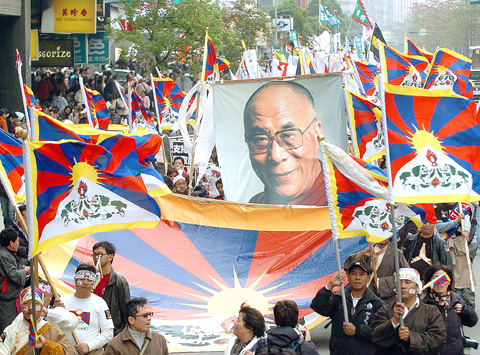Thousands of people marched in the streets of Taipei yesterday to commemorate the 50th anniversary of the 1959 Tibetan Uprising and show their support for Tibetans’ struggle for freedom.
“We Tibetans have been in exile for 50 years. The Chinese government tries hard to make us forget who we are — but we will not,” Regional Tibetan Youth Congress Taiwan chairman Tashi Tsering told the crowd before the march began.
“I was born in exile, but I never forget who I am, what my country is, and we all firmly believe that Tibet will become independent again,” Tashi said, as the crowd answered with a resounding “Free Tibet!”

PHOTO: FANG PIN-CHAO, TAIPEI TIMES
Nine years after China invaded Tibet in 1950, Tibetans launched an uprising during which the Tibetan political and religious leader, the Dalai Lama, went into exile in India, with tens of thousands of Tibetans following.
Tibetans continued to fight Chinese rule, resulting in more than 1.2 million deaths, Tibet support groups and the Tibetan government in exile have said.
The march started at the Zhongxiao Fuxing MRT station in Taipei and went through busy shopping districts.
Many shoppers joined in.
“Tibetans want to go home,” “China, get out of Tibet!” the demonstrators shouted as they marched, holding Tibetan flags, a large portrait of the Dalai Lama and various placards.
At 3:10pm, the procession stopped and observed a minute of silence for Tibetans killed in their struggle for freedom.
Several key figures from the Democratic Progressive Party took part in the rally.
Chinese democracy activist Cai Lujun (蔡陸軍) was also among the crowd.
“Opposing dictatorship and tyranny is a universal value that goes beyond nationalities or races,” Cai said. “Ignoring what’s going on in Tibet today is ignoring what will happen to Taiwan tomorrow.”
Aside from showing their usual support for Tibetans, many demonstrators this year voiced their worries about Taiwan’s future.
“We can see that freedom of speech and freedom of press are deteriorating in Taiwan, especially after Ma Ying-jeou [馬英九] took over as president [last year],” said Eric Chang (張浩明), a young demonstrator. “If we don’t stand up now, our fate could be the same as that of Tibetans.”
Weng Chih-ming, a 31-year-old technology company engineer, said he supported Tibet out of a sense of justice as a human being, adding that he didn’t want Taiwan to fall “under China’s dictatorship.”
An elementary school teacher surnamed Fu (傅) expressed similar concerns.
“I don’t want Taiwan to become like Tibet … I don’t want our next generation to live a hard life under Chinese rule,” Fu said.
Erinn Law, a Canadian who has been living in Taiwan for five years, echoed Chang’s view.
“Not enough people know about what’s going on [in Tibet], so we need to [speak up],” she said, clearly excited by the large crowd that had gathered for this year’s event.
“I don’t want what happened to Tibet to happen to Taiwan, because I love Taiwan,” she said.
ADDITIONAL REPORTING BY AP

TRAGEDY STRIKES TAIPEI: The suspect died after falling off a building after he threw smoke grenades into Taipei Main Station and went on a killing spree in Zhongshan A 27-year-old suspect allegedly threw smoke grenades in Taipei Main Station and then proceeded to Zhongshan MRT Station in a random killing spree that resulted in the death of the suspect and two other civilians, and seven injured, including one in critical condition, as of press time last night. The suspect, identified as a man surnamed Chang Wen (張文), allegedly began the attack at Taipei Main Station, the Taipei Fire Department said, adding that it received a report at 5:24pm that smoke grenades had been thrown in the station. One man in his 50s was rushed to hospital after a cardiac arrest

A car bomb killed a senior Russian general in southern Moscow yesterday morning, the latest high-profile army figure to be blown up in a blast that came just hours after Russian and Ukrainian delegates held separate talks in Miami on a plan to end the war. Kyiv has not commented on the incident, but Russian investigators said they were probing whether the blast was “linked” to “Ukrainian special forces.” The attack was similar to other assassinations of generals and pro-war figures that have either been claimed, or are widely believed to have been orchestrated, by Ukraine. Russian Lieutenant General Fanil Sarvarov, 56, head

SAFETY FIRST: Double the number of police were deployed at the Taipei Marathon, while other cities released plans to bolster public event safety Authorities across Taiwan have stepped up security measures ahead of Christmas and New Year events, following a knife and smoke bomb attack in Taipei on Friday that left four people dead and 11 injured. In a bid to prevent potential copycat incidents, police deployments have been expanded for large gatherings, transport hubs, and other crowded public spaces, according to official statements from police and city authorities. Taipei Mayor Chiang Wan-an (蔣萬安) said the city has “comprehensively raised security readiness” in crowded areas, increased police deployments with armed officers, and intensified patrols during weekends and nighttime hours. For large-scale events, security checkpoints and explosives

PUBLIC SAFETY: The premier said that security would be tightened in transport hubs, while President Lai commended the public for their bravery The government is to deploy more police, including rapid response units, in crowded public areas to ensure a swift response to any threats, President William Lai (賴清德) said yesterday after a knife attack killed three people and injured 11 in Taipei the previous day. Lai made the remarks following a briefing by the National Police Agency on the progress of the investigation, saying that the attack underscored the importance of cooperation in public security between the central and local governments. The attack unfolded in the early evening on Friday around Taipei Main Station’s M7 exit and later near the Taipei MRT’s Zhongshan